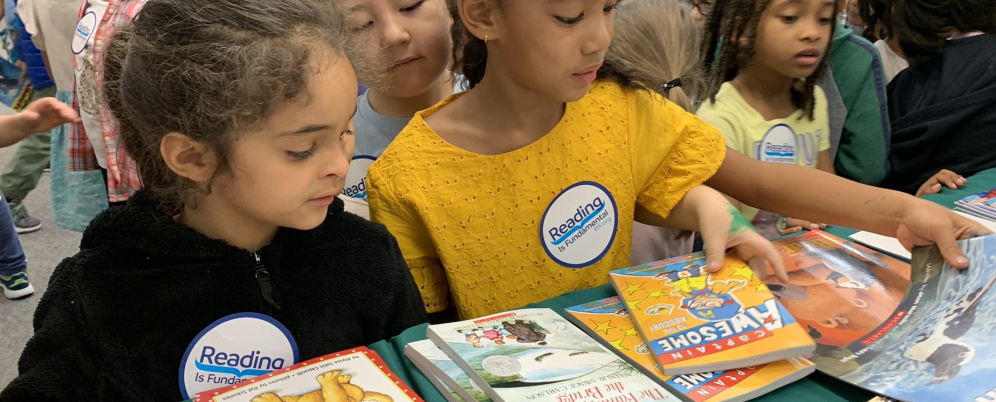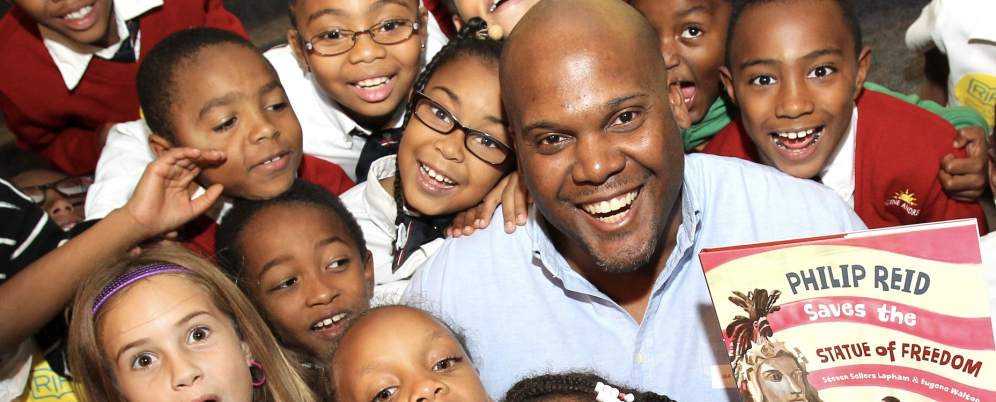The decline in reading scores is threatening our economy. It’s time to make literacy a priority.
The 2022 National Assessment of Educational Progress (NAEP) reading results have been top of mind for us at Reading Is Fundamental (RIF) as well as for many of our partners. The nation saw a preview of this year’s disappointing reading scores with the NAEP Long-Term Trend results announced in September and more recently, the October 24th NAEP main scores were announced showing a disheartening drop in reading performance back to 1992 levels. The state of children’s reading is concerning but we believe we can unite to change the tide. Today, we want to share this opinion piece from Alicia Levi, RIF’s President & CEO, and Bobby Amirshahi, Senior Vice President of Corporate Communication who leads community and social impact for Macy’s, Inc. This is an ongoing discussion we must all continue to have to find solutions to help reverse this trend and set our nation’s children on a path for success.

Last week, the Nation’s Report Card revealed to the world something that U.S. educators already knew: many of our students are struggling to read. School disruptions caused by COVID-19 have erased more than 30 years of progress in children’s reading achievement, with scores dropping to levels not seen since 1990. Only one in three students met proficiency standards. And the devastating impact spared no state or region or demographic, while the most vulnerable students, especially those of color, experienced the more significant declines. Average reading scores for fourth-grade students dropped 3 points, while those for Black students dropped 5 points, with declines of 4 and 7 points for Latinx and American Indian, respectively.
The news comes amid seismic changes to the nation’s workforce. The World Economic Forum (WEF) predicts that by 2025 — just three short years from now — 85 million low-wage, low-skill jobs could disappear globally due to automation. However, WEF anticipates the emergence of 97 million new jobs that will require not only a greater grasp of technology, but a higher degree of “soft skills” like critical thinking, flexibility, perseverance and problem-solving.
Because literacy is the foundation for all of those skills, literacy will be the foundation for all those new jobs.
These dual challenges in K-12 education and the workforce are inextricably bound. And to state it simply, we don’t have 30 years to wait for pre-pandemic reading proficiency levels to return and for a generation of children to get back on pathways to jobs in emerging fields. How we choose to respond to this crisis — and it is indeed a crisis — will not only impact the recovery, but also our nation’s standing in the world economy.
That’s why we're calling on corporate America to make reading proficiency a cornerstone of their advocacy platforms. Yes, schools obviously will serve as the primary center for our students’ academic recovery, as programs to support student success gain more traction. But K-12 educators, who already are stretched thin and have shown remarkable resilience and innovation throughout the pandemic, can’t do it alone.
If the U.S. economy is to remain competitive, then schools will need the business world to reassert their role as members of the “village” responsible for supporting children as they grow into productive adults.
Businesses large and small can play a critical role in boosting reading proficiency by investing in childhood literacy initiatives, encouraging family and community engagement and leveraging their workforce for employee youth mentoring and volunteerism. Take, for instance, some recent efforts by corporate partners of the nonprofit Reading Is Fundamental. A study commissioned by RIF found that access to reading materials is positively tied to children’s attitudes, reading behavior, emergent literacy and reading achievement. With that in mind, Macy’s has worked with RIF to give away nearly 15 million free books and reading resources to children, especially in the country’s most under-resourced communities over an 18 year partnership. Likewise, Trane Technologies and RIF recently provided more than 150,000 children with six new books each, and sponsored employee engagement activities that provided literacy kits to students.
Macy’s work shows the impact companies can have when they mobilize their resources to create a culture of literacy that connects school to home. Part of their social purpose platform, Mission Every One, is to empower youth to create a brighter future with bold represenation and provide opportunities to learn, dream and create a successful future without boundaries. When children can read, they’re able to better realize their full potential and better prepared to be part of a strong future workforce.
As long ago as December 2016, the Business Roundtable sounded the alarm about the growing crisis with literacy and the workforce, releasing a report tying literacy education to solving the skills shortage among American workers. “A focus on improving third-grade reading proficiency offers a powerful lever to address many aspects of the skills gap over the long-term,” the report noted years before pandemic-related learning disruptions, the Great Resignation and the work-from-home revolution upped the ante. Without immediate action, the issue could threaten productivity and weaken the U.S. economy, the report said. It also urged CEOs to take a public stance on third-grade reading proficiency by promoting supportive policy agendas, encouraging employee involvement and donating time and money to the cause.
Nearly six years later, the stakes are much higher — not just for our nation’s children, but for our economy as well. It’s time for companies of all sizes and across all industries to take action to ensure that the next generation of workers have the foundational literacy skills they need to operate in the workplace.
Alicia Levi is president and CEO of Reading Is Fundamental, the nation’s largest children’s literacy nonprofit. Bobby Amirshahi is the senior vice president of corporate communications for Macy’s, Inc. and leads community and social impact at Macy’s.

